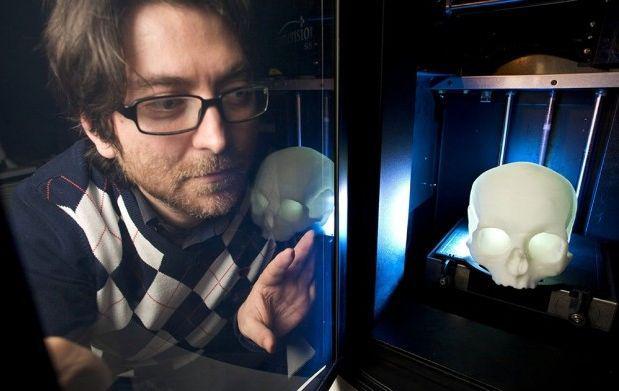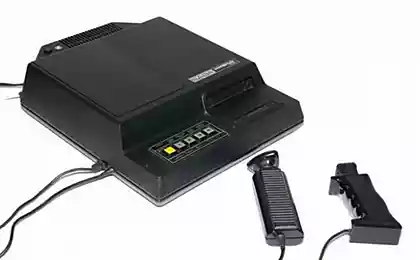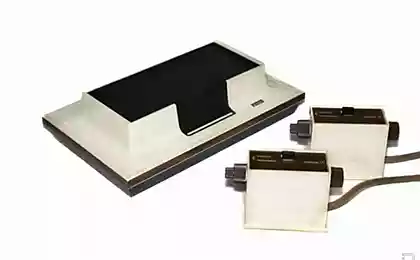1157
Technological trends in 2013
2014 in the technology promises to be no less interesting than the last. Mobile devices will continue to build "smart" and learn to more accurately anticipate the desires of the owner. The users have to say goodbye with a sense of "invisible" on the Internet, which is increasingly will demonstrate how well "knows" of visitors.
3D-printing, robotics, smart devices promise to qualitatively change the industrial and consumer market.

Hybrid computers or devices "2-in-1»
Hybrid computers were born in 2013. This tablet with detachable keyboard unit, which assembled resemble the old desktop computers. On the market a lot of these models, but until now they have been too expensive for the mass market.
In 2014, the price of hybrids should be lower, and the devices themselves - popular. They will benefit as those who are accustomed to desktop computers, as well as those who prefer tablets, but want to have something more. The company Intel, for example, believe that this hybrid model will take in 2014 a dominant position in the PC market. Apple
Apple is preparing to offer a new conceptual model of desktop computer - MacPro. He will have a cylindrical body, a powerful processor with 12 cores and a clock frequency of 4 GHz, the possibility of output to the monitor image with a resolution of 4K - as most modern TVs. It provides the possibility to create a personal data store.
Price MacPro will be close to the current premium segment of the market. The minimum version of the MacPro will cost $ 2999, fully furnished MacPro will cost $ 10,000 and up. What for? Apple is preparing to set a new standard for price and revive the desktop market, which is strongly passed in recent years. This will bring the industry new money. Manufacturers 4K displays already supported by Apple in its endeavor.
lntel
The main global producer of processors will continue to produce microchips, which will be smaller, and their multi-core - more. Already preparing for the release of processors series Broadwell, allowing the application of 14 nm technology standards and place in a single processor to 18 cores. Still the flagship - the processors Haswell - will have to give leadership to the new favorite. Overall, the path of development, promoted by Intel, will remain the same: build-processor performance by equipping even more cores without increasing the speed of a single core.
Universal charger
Until now, every notebook manufacturer to produce its own type of charging devices that are not always easy and convenient. Now there is a harmonization of the new standard charges. We can expect that in 2014 the producers finally move to a universal model of the charger, which is suitable for all notebooks.
Smartphones and tablets

64-bit processors
Release of the 2013 model, Apple iPhone 5S with a 64-bit processor A7 was the signal for the market. Samsung has decided in early 2014 to issue its own 64-bit processor and equip their next flagship smartphone Samsung Galaxy S5.
The transition to 64-bit architecture also confirmed by other manufacturers of processors - Qualcomm, Nvidia and Broadcom. Their 64-bit models will be available in the first half of 2014, and the 64-bit ARM-systems will be equipped with not only mobile gadgets, and network computers and servers.
In the second half of 2014 will add to the list of manufacturers of low-end - and the company MediaTek Allwinner, which also move to release 64-bit models.
New design: the curved geometry
The curved shape of the body will gradually replace the flat design typical for current models of smartphones and PHABLET. The company LG, for example, believe that by 2015 about 12% of new smartphones will have a curved design, and by 2018 their share was 40%.
"Legislators" of the fashion began to LG and Samsung. LG has released one of the first model with a curved screen (LG G Flex). Moreover, it announced its ambitious plans to develop a smartphone that will have a flexible body. Although it plans further prospects: according to experts, the industrial production of flexible displays are absolutely to be expected no earlier than 10 years.
Release smartphone with a curved geometry display has tried to master in 2013, Samsung model Galaxy Round. Unlike LG's body was not bent along and across. But the experience of the first sales showed that this design does not like customers. Nevertheless, Samsung ready to continue experimenting with the design. The company's plans for 2014 - the release of the smartphone, the display is bent at one end by end, where will be located control buttons.
According to rumors, developing its own smartphone with curved display leads and Apple. The new model may appear in 2014.
Google vs. Apple
The main advantage of iPhone - great graphics. With the release of the 2013 model iPhone 5S reached a new milestone - resolution 326 ppi. However, Apple's competitors on its heels. So, Android 4.4 KitKat update allows you to use a resolution of 560 pixels, Samsung is going to implement this feature in the new model GalaxyS5.
Apple is preparing to give its own answer. Modern televisions, monitors, cameras and camcorders allow the resolution 2K, and Apple plans to launch in 2014 a new tablet iPadBiggie with such a resolution, bringing the size of the diagonal of the display to 12, 9 inches. A few months later, Apple plans to release a more powerful model iPad with a display resolution of 4K.
To catch up with the leaders of the mobile OS
Smartphone makers do not lose hope to oust Google and Apple in the market for mobile operating systems. Already in early 2014, Samsung and Intel plans to launch its own system TizenOS for smart phones and cameras. At most Android in 2013 have already appeared official clones. This is a version of CyanogenMod, which is developing a separate group of developers. They are built into the system features that are not supported by Google in its main direction of development of Android.
Asus company will propose in 2014 a series of plates, where they will work, and Android, and Windows 8.
Wearable gadgets

Wearable electronics
According ABIResearch, worldwide shipments of portable devices in 2013 exceeded 50 million units. According to forecasts, by the end of 2014 the market will present about 100 million portable gadgets, and by 2018 their number will exceed 540 million.
In 2013, the major players in this market is considered the company Sony, Samsung, Pebble. There were visible and projects that received "national" funding online platform Kickstarter. And in 2014 this market will become even more "hot". It is planned to have new major players: Apple, Google, Microsoft, Nokia, Motorola, LG. They also join the company, not directly related to the IT industry. For example, Nike, which already has at its disposal a fitness tracker FuelBand, but will complement it in 2014 release of its own model of smart hours.
Programs for handheld gadgets
In 2013 there was a rapid growth of mobile applications dedicated to the health, sports, scientific power. The number of issued software, according to Research2Guidance, has already exceeded 100 000 items, which are notable success among customers: daily number of downloads for the program of the top-10 this subject more than 4 million.
Until now, mobile applications for portable gadgets mainly to accumulate information on the person. In 2014, they will feature daily advice with recommendations on diet, lifestyle changes. Advice will be given on the basis of the gadgets on the lifestyle of their owners. At least it can help save people from a variety of chronic diseases.
Smart Textiles and Clothing
This market segment must be finalized in 2014, and, according to the company's forecast for 2018 MarketsandMarkets, the market is expected to exceed $ 2 billion.
Already known examples First developments in this field. For example, OMsignal to become the first manufacturer in the world biochuvstvitelnoy special clothing, which is able to track changes in human well-being. Its built-in sensors will detect heart rate, breathing rhythm, level of physical activity. The collected data can be monitored in real time via a smartphone.
Another example development provides Wearable Sports Electronics, a division of Adidas. In 2014, it plans to introduce the technology to the consumer market, which previously applied only to professional sports. For example, sport shirts miCoachElite with built-in - such goods are still used, for example, athletes Professional Football League MLS.
Robotics

In the next few years, robots must make a breakthrough, the prerequisites for which were laid in the creation of artificial intelligence in the last 40 years. Until now, the market was not understanding, who will buy these "miracle device" and who will serve them.
One of the most famous examples of developments in the field of robotics research companies were BostonDynamics. For several years, she led a project US defense DARPA, but in late 2013 the development was acquired by Google. With them will be - one of the mysteries, the answer to that has to give in 2014.
Areas of robotics in 2014
Two-armed robot. In this direction work SeikoEpson, Nachi, ABB, Kawada. They created robots resemble the people that, according to the developers, should provide the consumer demand.
Robot manipulators. Such systems are still designed primarily for industry, but the idea of remote access and control of the implementation of the detailed operations of the manipulator can be used in the consumer sector.
Wearable robotic device. It is about the development of eco-skeletons, which are now out mass circulation. They are designed to assist people with disabilities, to conduct therapy and rehabilitation, to help athletes in training.
"Smart House»

Today, "smart home" - it's all kinds of lighting control, security, access control in housing, climate control, mechanization garage doors, shutter control electronics for home entertainment.
The development of "cloud" technologies
In 2014, the expected breakthrough in the development of video surveillance systems, which are increasingly working through "the cloud." But if you are still in the "cloud" accumulated a video, now would be a novelty analytical functions that are provided through the "cloud" and use the data collected there. At the same time in 2014 is expected to decline in prices for electronic gadgets that are used for "smart home", as well as the services of installation and maintenance. The market is becoming a mass, which leads to the democratization of prices.
"Zoo" technologies
There is a chance that 2014 will be systematized technology "smart home". Now there is a real "zoo" among the devices used in these homes. For example, among the wired and wireless communication methods have BACnet, LonWorks, ZigBee, EnOcean, Bluetooth, Z-Wave, Wi-Fi, NFC. For the consumer it is too much. In 2014, original equipment manufacturers will have to move towards each other for the sake of enhancing the user's convenience.
Unified automation server
To combine multiple gadgets in one system "smart house", you need a single server automation. Now such a server, the niche is not occupied and on the market a lot of options for individual installations. You should see the leader, which will be used for the competition. Who will give a signal to action?
It is possible that elements of a server platform may occur, for example, in the future model of AppleTV. But as long as the issue remains open.
Games

In 2014, it will continue to be popular for video game consoles. The main source of income for their creators are not selling, and additional services acquired in the course of the game. So, according to statistics, the average check for the purchase of additional "features" of $ 16, 50 with one player.
Also it increases the popularity of games for tablets. According to forecasts, by 2016, their share in the gaming roar reached 47, 6%. In 2014, games for iOS will be more popular games for Android, but the application for the latter will quickly reduce the backlog.
Sales of games will stimulate sales of TVs, desktop computers, smartphones and tablets. For the past two years the number of gamers in the US, using all types of gaming devices increased by 25%, and the total number was 40 million. But this trend is most actively manifested in China and Spain.
Televisions

Ultra HD and curved design
Even in 2012, it was approved by the term «Ultra High Definition» or «Ultra HD» instead of the previous 4K. In 2013, the leading TV manufacturers relied on this standard - screen resolution of at least 3840h2160 pixels, the presence of a digital input, and the aspect ratio of 16x9. Last year, a new series of OLED-TVs with a curved shape of the screen, which has become an alternative to "stall» 3D-TV. The main competitors in the TV market was Sony, LG, Samsung.
This year, manufacturers began the battle in January at the exhibition CES 2014. There, LG and Samsung presented its first model with flexible screen TVs. This - the same curved screen, but now his form can be adapted to the location of the viewer. Samsung also plans to demonstrate the technology to control the TV with gestures.
Smart choice of video
Google is preparing to release in the first half of 2014 NexusTV - set-top box based on Android with the capabilities of the gaming console. With it you can view streaming video that will be collected from various sources of video content: Netflix, Hulu and YouTube. The novelty of the gadget is that it can intelligently "anticipate" viewer desires and offers a choice of interesting videos for him.
The technology takes into account gender and age, history of previous views, the choice of other viewers with similar preferences spectator.
3D-press

In 2014, 3D-press will continue to beat records of popularity. It is connected not only to the fact that items can be created from a metal, ceramic or plastic materials. The main factor - now they can be "printed" to order. This market saw power in the US, for example, is already working on a bill for the legal regulation of the 3D-printing. 2014 will be an important technology for the development of another reason that this market must withdraw such large vendors like HP, Samsung and Microsoft.
Data warehouses

Mobile Storage Systems
Storage capacity for mobile devices (smartphones and tablets) will continue in 2014 at the same level - it will be from 16 to 64 GB for smartphones and from 32 to 128 GB for tablets.
"Cloud" storage
In 2014, with the further development of mobile Internet is growing consumer interest in "cloud" technologies. Members will actively move data to personal storage in the "cloud". This will benefit both producers and consumers, who will have access to a set of new "cloud" services. All this can lead to an explosive growth in popularity of personal "cloud."
Storage hard drives
The main producers - Seagate, Western Digital and Toshiba - will actively implement the 2014 hybrid hard drives. They are characterized, above all, a small shell thickness (about 5 mm) and economical in terms of energy consumption flash memory.
As a result, the market will be a lot of new models of ultra-thin laptops with a large amount of local memory. They are particularly popular where the level of development of the mobile Internet will not allow the "cloud" technology to compete with them.
Mobile trading

"Mass customization" of goods sold
Recently purchases via smartphones and tablets available in a separate area, which develops, without exception, in all developed countries. Many trading companies have already released an application for smartphones. In 2014, the expected mass production of mobile trading applications for tablets.
In most trade will continue the process of "mass customization" of goods sold. This means that before you make a purchase, the customer selects a product, the most adapted to its taste: the color, the size, the list of properties. For this he uses a variety of technology and mobile gadgets.
Mobile wallet
In 2014, it will continue to gain in popularity mobile wallet - a special application for the smartphone. However, according to forecasts, this payment method to truly win the market only a few years.
In the meantime, various start-ups are developing their own version of a mobile wallet, but the final choice of users gradually allocate one or two leaders. Candidates at this place called PayPal and Google, but it is not excluded that there may be other leaders.
"Big data" in trade
3D-printing, robotics, smart devices promise to qualitatively change the industrial and consumer market.

Hybrid computers or devices "2-in-1»
Hybrid computers were born in 2013. This tablet with detachable keyboard unit, which assembled resemble the old desktop computers. On the market a lot of these models, but until now they have been too expensive for the mass market.
In 2014, the price of hybrids should be lower, and the devices themselves - popular. They will benefit as those who are accustomed to desktop computers, as well as those who prefer tablets, but want to have something more. The company Intel, for example, believe that this hybrid model will take in 2014 a dominant position in the PC market. Apple
Apple is preparing to offer a new conceptual model of desktop computer - MacPro. He will have a cylindrical body, a powerful processor with 12 cores and a clock frequency of 4 GHz, the possibility of output to the monitor image with a resolution of 4K - as most modern TVs. It provides the possibility to create a personal data store.
Price MacPro will be close to the current premium segment of the market. The minimum version of the MacPro will cost $ 2999, fully furnished MacPro will cost $ 10,000 and up. What for? Apple is preparing to set a new standard for price and revive the desktop market, which is strongly passed in recent years. This will bring the industry new money. Manufacturers 4K displays already supported by Apple in its endeavor.
lntel
The main global producer of processors will continue to produce microchips, which will be smaller, and their multi-core - more. Already preparing for the release of processors series Broadwell, allowing the application of 14 nm technology standards and place in a single processor to 18 cores. Still the flagship - the processors Haswell - will have to give leadership to the new favorite. Overall, the path of development, promoted by Intel, will remain the same: build-processor performance by equipping even more cores without increasing the speed of a single core.
Universal charger
Until now, every notebook manufacturer to produce its own type of charging devices that are not always easy and convenient. Now there is a harmonization of the new standard charges. We can expect that in 2014 the producers finally move to a universal model of the charger, which is suitable for all notebooks.
Smartphones and tablets

64-bit processors
Release of the 2013 model, Apple iPhone 5S with a 64-bit processor A7 was the signal for the market. Samsung has decided in early 2014 to issue its own 64-bit processor and equip their next flagship smartphone Samsung Galaxy S5.
The transition to 64-bit architecture also confirmed by other manufacturers of processors - Qualcomm, Nvidia and Broadcom. Their 64-bit models will be available in the first half of 2014, and the 64-bit ARM-systems will be equipped with not only mobile gadgets, and network computers and servers.
In the second half of 2014 will add to the list of manufacturers of low-end - and the company MediaTek Allwinner, which also move to release 64-bit models.
New design: the curved geometry
The curved shape of the body will gradually replace the flat design typical for current models of smartphones and PHABLET. The company LG, for example, believe that by 2015 about 12% of new smartphones will have a curved design, and by 2018 their share was 40%.
"Legislators" of the fashion began to LG and Samsung. LG has released one of the first model with a curved screen (LG G Flex). Moreover, it announced its ambitious plans to develop a smartphone that will have a flexible body. Although it plans further prospects: according to experts, the industrial production of flexible displays are absolutely to be expected no earlier than 10 years.
Release smartphone with a curved geometry display has tried to master in 2013, Samsung model Galaxy Round. Unlike LG's body was not bent along and across. But the experience of the first sales showed that this design does not like customers. Nevertheless, Samsung ready to continue experimenting with the design. The company's plans for 2014 - the release of the smartphone, the display is bent at one end by end, where will be located control buttons.
According to rumors, developing its own smartphone with curved display leads and Apple. The new model may appear in 2014.
Google vs. Apple
The main advantage of iPhone - great graphics. With the release of the 2013 model iPhone 5S reached a new milestone - resolution 326 ppi. However, Apple's competitors on its heels. So, Android 4.4 KitKat update allows you to use a resolution of 560 pixels, Samsung is going to implement this feature in the new model GalaxyS5.
Apple is preparing to give its own answer. Modern televisions, monitors, cameras and camcorders allow the resolution 2K, and Apple plans to launch in 2014 a new tablet iPadBiggie with such a resolution, bringing the size of the diagonal of the display to 12, 9 inches. A few months later, Apple plans to release a more powerful model iPad with a display resolution of 4K.
To catch up with the leaders of the mobile OS
Smartphone makers do not lose hope to oust Google and Apple in the market for mobile operating systems. Already in early 2014, Samsung and Intel plans to launch its own system TizenOS for smart phones and cameras. At most Android in 2013 have already appeared official clones. This is a version of CyanogenMod, which is developing a separate group of developers. They are built into the system features that are not supported by Google in its main direction of development of Android.
Asus company will propose in 2014 a series of plates, where they will work, and Android, and Windows 8.
Wearable gadgets

Wearable electronics
According ABIResearch, worldwide shipments of portable devices in 2013 exceeded 50 million units. According to forecasts, by the end of 2014 the market will present about 100 million portable gadgets, and by 2018 their number will exceed 540 million.
In 2013, the major players in this market is considered the company Sony, Samsung, Pebble. There were visible and projects that received "national" funding online platform Kickstarter. And in 2014 this market will become even more "hot". It is planned to have new major players: Apple, Google, Microsoft, Nokia, Motorola, LG. They also join the company, not directly related to the IT industry. For example, Nike, which already has at its disposal a fitness tracker FuelBand, but will complement it in 2014 release of its own model of smart hours.
Programs for handheld gadgets
In 2013 there was a rapid growth of mobile applications dedicated to the health, sports, scientific power. The number of issued software, according to Research2Guidance, has already exceeded 100 000 items, which are notable success among customers: daily number of downloads for the program of the top-10 this subject more than 4 million.
Until now, mobile applications for portable gadgets mainly to accumulate information on the person. In 2014, they will feature daily advice with recommendations on diet, lifestyle changes. Advice will be given on the basis of the gadgets on the lifestyle of their owners. At least it can help save people from a variety of chronic diseases.
Smart Textiles and Clothing
This market segment must be finalized in 2014, and, according to the company's forecast for 2018 MarketsandMarkets, the market is expected to exceed $ 2 billion.
Already known examples First developments in this field. For example, OMsignal to become the first manufacturer in the world biochuvstvitelnoy special clothing, which is able to track changes in human well-being. Its built-in sensors will detect heart rate, breathing rhythm, level of physical activity. The collected data can be monitored in real time via a smartphone.
Another example development provides Wearable Sports Electronics, a division of Adidas. In 2014, it plans to introduce the technology to the consumer market, which previously applied only to professional sports. For example, sport shirts miCoachElite with built-in - such goods are still used, for example, athletes Professional Football League MLS.
Robotics

In the next few years, robots must make a breakthrough, the prerequisites for which were laid in the creation of artificial intelligence in the last 40 years. Until now, the market was not understanding, who will buy these "miracle device" and who will serve them.
One of the most famous examples of developments in the field of robotics research companies were BostonDynamics. For several years, she led a project US defense DARPA, but in late 2013 the development was acquired by Google. With them will be - one of the mysteries, the answer to that has to give in 2014.
Areas of robotics in 2014
Two-armed robot. In this direction work SeikoEpson, Nachi, ABB, Kawada. They created robots resemble the people that, according to the developers, should provide the consumer demand.
Robot manipulators. Such systems are still designed primarily for industry, but the idea of remote access and control of the implementation of the detailed operations of the manipulator can be used in the consumer sector.
Wearable robotic device. It is about the development of eco-skeletons, which are now out mass circulation. They are designed to assist people with disabilities, to conduct therapy and rehabilitation, to help athletes in training.
"Smart House»

Today, "smart home" - it's all kinds of lighting control, security, access control in housing, climate control, mechanization garage doors, shutter control electronics for home entertainment.
The development of "cloud" technologies
In 2014, the expected breakthrough in the development of video surveillance systems, which are increasingly working through "the cloud." But if you are still in the "cloud" accumulated a video, now would be a novelty analytical functions that are provided through the "cloud" and use the data collected there. At the same time in 2014 is expected to decline in prices for electronic gadgets that are used for "smart home", as well as the services of installation and maintenance. The market is becoming a mass, which leads to the democratization of prices.
"Zoo" technologies
There is a chance that 2014 will be systematized technology "smart home". Now there is a real "zoo" among the devices used in these homes. For example, among the wired and wireless communication methods have BACnet, LonWorks, ZigBee, EnOcean, Bluetooth, Z-Wave, Wi-Fi, NFC. For the consumer it is too much. In 2014, original equipment manufacturers will have to move towards each other for the sake of enhancing the user's convenience.
Unified automation server
To combine multiple gadgets in one system "smart house", you need a single server automation. Now such a server, the niche is not occupied and on the market a lot of options for individual installations. You should see the leader, which will be used for the competition. Who will give a signal to action?
It is possible that elements of a server platform may occur, for example, in the future model of AppleTV. But as long as the issue remains open.
Games

In 2014, it will continue to be popular for video game consoles. The main source of income for their creators are not selling, and additional services acquired in the course of the game. So, according to statistics, the average check for the purchase of additional "features" of $ 16, 50 with one player.
Also it increases the popularity of games for tablets. According to forecasts, by 2016, their share in the gaming roar reached 47, 6%. In 2014, games for iOS will be more popular games for Android, but the application for the latter will quickly reduce the backlog.
Sales of games will stimulate sales of TVs, desktop computers, smartphones and tablets. For the past two years the number of gamers in the US, using all types of gaming devices increased by 25%, and the total number was 40 million. But this trend is most actively manifested in China and Spain.
Televisions

Ultra HD and curved design
Even in 2012, it was approved by the term «Ultra High Definition» or «Ultra HD» instead of the previous 4K. In 2013, the leading TV manufacturers relied on this standard - screen resolution of at least 3840h2160 pixels, the presence of a digital input, and the aspect ratio of 16x9. Last year, a new series of OLED-TVs with a curved shape of the screen, which has become an alternative to "stall» 3D-TV. The main competitors in the TV market was Sony, LG, Samsung.
This year, manufacturers began the battle in January at the exhibition CES 2014. There, LG and Samsung presented its first model with flexible screen TVs. This - the same curved screen, but now his form can be adapted to the location of the viewer. Samsung also plans to demonstrate the technology to control the TV with gestures.
Smart choice of video
Google is preparing to release in the first half of 2014 NexusTV - set-top box based on Android with the capabilities of the gaming console. With it you can view streaming video that will be collected from various sources of video content: Netflix, Hulu and YouTube. The novelty of the gadget is that it can intelligently "anticipate" viewer desires and offers a choice of interesting videos for him.
The technology takes into account gender and age, history of previous views, the choice of other viewers with similar preferences spectator.
3D-press

In 2014, 3D-press will continue to beat records of popularity. It is connected not only to the fact that items can be created from a metal, ceramic or plastic materials. The main factor - now they can be "printed" to order. This market saw power in the US, for example, is already working on a bill for the legal regulation of the 3D-printing. 2014 will be an important technology for the development of another reason that this market must withdraw such large vendors like HP, Samsung and Microsoft.
Data warehouses

Mobile Storage Systems
Storage capacity for mobile devices (smartphones and tablets) will continue in 2014 at the same level - it will be from 16 to 64 GB for smartphones and from 32 to 128 GB for tablets.
"Cloud" storage
In 2014, with the further development of mobile Internet is growing consumer interest in "cloud" technologies. Members will actively move data to personal storage in the "cloud". This will benefit both producers and consumers, who will have access to a set of new "cloud" services. All this can lead to an explosive growth in popularity of personal "cloud."
Storage hard drives
The main producers - Seagate, Western Digital and Toshiba - will actively implement the 2014 hybrid hard drives. They are characterized, above all, a small shell thickness (about 5 mm) and economical in terms of energy consumption flash memory.
As a result, the market will be a lot of new models of ultra-thin laptops with a large amount of local memory. They are particularly popular where the level of development of the mobile Internet will not allow the "cloud" technology to compete with them.
Mobile trading

"Mass customization" of goods sold
Recently purchases via smartphones and tablets available in a separate area, which develops, without exception, in all developed countries. Many trading companies have already released an application for smartphones. In 2014, the expected mass production of mobile trading applications for tablets.
In most trade will continue the process of "mass customization" of goods sold. This means that before you make a purchase, the customer selects a product, the most adapted to its taste: the color, the size, the list of properties. For this he uses a variety of technology and mobile gadgets.
Mobile wallet
In 2014, it will continue to gain in popularity mobile wallet - a special application for the smartphone. However, according to forecasts, this payment method to truly win the market only a few years.
In the meantime, various start-ups are developing their own version of a mobile wallet, but the final choice of users gradually allocate one or two leaders. Candidates at this place called PayPal and Google, but it is not excluded that there may be other leaders.
"Big data" in trade
























